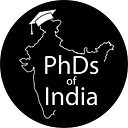The Aboriginals
“Although I have been reading story books since childhood, my interest in literature strengthened in Standard IX after reading Julius Caesar. But because I was good at studies, I opted for Science in high school instead of Arts as per the general norm. On the very first day of Standard XI, I realized I had made a wrong decision.
I somehow managed to finish those 2 years of school and finally opted for literature, my true calling. There was no looking back since then. The exposure in terms of diversity, both economical and cultural, that I got on going to a government-aided college after having studied in private schools throughout my life, shaped me as a person. It made me more empathetic and accommodating to the world view. It was during my Master’s when I came across post-colonial studies which intrigued me and motivated me to pursue it further.
My PhD work centers around aboriginal literature, within the realm of post-colonial studies. Aboriginals, the indigenous inhabitants of Australia, are often overshadowed in the country’s narrative, dominated by images of white Australians. Aboriginal literature seeks to reclaim and rewrite their history, asserting their presence and identity. My research examines the interplay of history, time, and memory in this literature, highlighting the political struggle for recognition and voice.
Since I joined PhD right after my Master’s, in the initial days, I wasn’t well versed with research methodology and struggled to write good papers. I faced multiple rejections from multiple journals which made me question my credibility as a PhD student. Additionally, I couldn’t clear UGC NET twice after my Master’s, which added to the pressure. There was a period when I was just sitting at home, doing nothing but just preparing for exams that I was consistently failing to qualify for. Fortunately, I did crack both NET and JRF in my third attempt, which marked the highest point of my academic career.
I also thought that a supervisor would hand-hold me in every minuscule problem I faced. But in hindsight, I think it’s important that we learn to find our own way in order to grow as a scholar. My supervisor molded me in ways where I could overcome these challenges through patience and persistent trying. I remember being quite adamant about not changing the structure of a paper which had got rejected thrice because I had put in a lot of effort writing it. It was my supervisor and a group of friends who actually made me think otherwise and I was finally able to publish that paper.
Now after spending 4 years in my PhD, although I realize the value of publications, I think this concept of “publish or perish” needs to change in our academic system. We are always under a constant pressure to publish papers which affects the overall quality of research itself. Furthermore, a PhD demands an incredible amount of patience and the zeal of not giving up. It is easier said than done but in a field like literature which is vast in nature, if you inculcate a habit of reading anything that you lay your hands on, it will take you a long way.”
-Argha Bhattacharyya, PhD in English Literature, Indian Institute of Technology, Kharagpur
Interviewed and written by Payel Das
